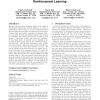473 search results - page 57 / 95 » Optimal policy switching algorithms for reinforcement learni... |
GECCO
2011
Springer
13 years 15 days ago
2011
Springer
The reward functions that drive reinforcement learning systems are generally derived directly from the descriptions of the problems that the systems are being used to solve. In so...
KDD
2002
ACM
14 years 9 months ago
2002
ACM
Recently, there has been increasing interest in the issues of cost-sensitive learning and decision making in a variety of applications of data mining. A number of approaches have ...
ATAL
2007
Springer
14 years 3 months ago
2007
Springer
It is known that the complexity of the reinforcement learning algorithms, such as Q-learning, may be exponential in the number of environment’s states. It was shown, however, th...
ML
1998
ACM
13 years 8 months ago
1998
ACM
Recent algorithmic and theoretical advances in reinforcement learning (RL) have attracted widespread interest. RL algorithmshave appeared that approximatedynamic programming on an ...
GECCO
2006
Springer
14 years 21 days ago
2006
Springer
Two mathematical and two computational theories from the field of human and animal learning are combined to produce a more general theory of adaptive behavior. The cornerstone of ...

